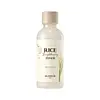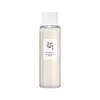What's inside
What's inside
 Key Ingredients
Key Ingredients

 Benefits
Benefits

 Concerns
Concerns

 Ingredients Side-by-side
Ingredients Side-by-side

Water
Skin ConditioningGlycerin
HumectantDipropylene Glycol
Humectant1,2-Hexanediol
Skin ConditioningButylene Glycol
HumectantNiacinamide
SmoothingIsopentyldiol
HumectantPanthenol
Skin ConditioningOlea Europaea Fruit Oil
MaskingEthylhexylglycerin
Skin ConditioningXanthan Gum
EmulsifyingCarbomer
Emulsion StabilisingAdenosine
Skin ConditioningTromethamine
BufferingPolyglyceryl-10 Laurate
Skin ConditioningPolyglyceryl-3 Methylglucose Distearate
EmulsifyingGlyceryl Stearate Se
EmulsifyingDisodium EDTA
Pantolactone
HumectantOryza Sativa Extract
AbsorbentMethyl Glucose Sesquistearate
EmollientSodium Hyaluronate
HumectantSodium Citrate
BufferingCitric Acid
BufferingOryza Sativa Bran Water
MaskingOryza Sativa Seed Water
AntimicrobialParfum
MaskingAspergillus Ferment
Skin ConditioningDipotassium Glycyrrhizate
HumectantGlycine
BufferingSerine
MaskingGlutamic Acid
HumectantAspartic Acid
MaskingLeucine
Skin ConditioningAlanine
MaskingLysine
Skin ConditioningArginine
MaskingTyrosine
MaskingPhenylalanine
MaskingValine
MaskingProline
Skin ConditioningThreonine
Isoleucine
Skin ConditioningHistidine
HumectantMethionine
Skin ConditioningCysteine
AntioxidantHydrolyzed Rice Protein
Skin ConditioningGluconolactone
Skin ConditioningCaprylhydroxamic Acid
Trehalose
HumectantSh-Oligopeptide-1
Skin ConditioningProtease
ExfoliatingWater, Glycerin, Dipropylene Glycol, 1,2-Hexanediol, Butylene Glycol, Niacinamide, Isopentyldiol, Panthenol, Olea Europaea Fruit Oil, Ethylhexylglycerin, Xanthan Gum, Carbomer, Adenosine, Tromethamine, Polyglyceryl-10 Laurate, Polyglyceryl-3 Methylglucose Distearate, Glyceryl Stearate Se, Disodium EDTA, Pantolactone, Oryza Sativa Extract, Methyl Glucose Sesquistearate, Sodium Hyaluronate, Sodium Citrate, Citric Acid, Oryza Sativa Bran Water, Oryza Sativa Seed Water, Parfum, Aspergillus Ferment, Dipotassium Glycyrrhizate, Glycine, Serine, Glutamic Acid, Aspartic Acid, Leucine, Alanine, Lysine, Arginine, Tyrosine, Phenylalanine, Valine, Proline, Threonine, Isoleucine, Histidine, Methionine, Cysteine, Hydrolyzed Rice Protein, Gluconolactone, Caprylhydroxamic Acid, Trehalose, Sh-Oligopeptide-1, Protease
Water
Skin ConditioningMethylpropanediol
SolventPropanediol
Solvent1,2-Hexanediol
Skin ConditioningGlycerin
HumectantGlycereth-26
HumectantPolymethyl Methacrylate
Oryza Sativa Extract
AbsorbentCoptis Japonica Root Extract
Skin ConditioningUlmus Davidiana Root Extract
Skin ConditioningAmaranthus Caudatus Seed Extract
Skin ConditioningFicus Carica Fruit Extract
HumectantCentella Asiatica Extract
CleansingTheobroma Cacao Seed Extract
AntioxidantHydrogenated Lecithin
EmulsifyingSodium Hyaluronate
HumectantPanthenol
Skin ConditioningHydroxyethyl Urea
HumectantAluminum Chlorohydrate
AstringentButylene Glycol
HumectantMicrocrystalline Cellulose
AbsorbentSodium Citrate
BufferingKaolin
AbrasiveEthylhexylglycerin
Skin ConditioningDipotassium Glycyrrhizate
HumectantCitric Acid
BufferingDextrin
AbsorbentCeramide NP
Skin ConditioningTocopherol
AntioxidantRice Amino Acids
Skin ConditioningWater, Methylpropanediol, Propanediol, 1,2-Hexanediol, Glycerin, Glycereth-26, Polymethyl Methacrylate, Oryza Sativa Extract, Coptis Japonica Root Extract, Ulmus Davidiana Root Extract, Amaranthus Caudatus Seed Extract, Ficus Carica Fruit Extract, Centella Asiatica Extract, Theobroma Cacao Seed Extract, Hydrogenated Lecithin, Sodium Hyaluronate, Panthenol, Hydroxyethyl Urea, Aluminum Chlorohydrate, Butylene Glycol, Microcrystalline Cellulose, Sodium Citrate, Kaolin, Ethylhexylglycerin, Dipotassium Glycyrrhizate, Citric Acid, Dextrin, Ceramide NP, Tocopherol, Rice Amino Acids
 Reviews
Reviews

Ingredients Explained
These ingredients are found in both products.
Ingredients higher up in an ingredient list are typically present in a larger amount.
1,2-Hexanediol is a synthetic liquid and another multi-functional powerhouse.
It is a:
- Humectant, drawing moisture into the skin
- Emollient, helping to soften skin
- Solvent, dispersing and stabilizing formulas
- Preservative booster, enhancing the antimicrobial activity of other preservatives
Butylene Glycol (or BG) is used within cosmetic products for a few different reasons:
Overall, Butylene Glycol is a safe and well-rounded ingredient that works well with other ingredients.
Though this ingredient works well with most skin types, some people with sensitive skin may experience a reaction such as allergic rashes, closed comedones, or itchiness.
Learn more about Butylene GlycolCitric Acid is an alpha hydroxy acid (AHA) naturally found in citrus fruits like oranges, lemons, and limes.
Like other AHAs, citric acid can exfoliate skin by breaking down the bonds that hold dead skin cells together. This helps reveal smoother and brighter skin underneath.
However, this exfoliating effect only happens at high concentrations (20%) which can be hard to find in cosmetic products.
Due to this, citric acid is usually included in small amounts as a pH adjuster. This helps keep products slightly more acidic and compatible with skin's natural pH.
In skincare formulas, citric acid can:
While it can provide some skin benefits, research shows lactic acid and glycolic acid are generally more effective and less irritating exfoliants.
Most citric acid used in skincare today is made by fermenting sugars (usually from molasses). This synthetic version is identical to the natural citrus form but easier to stabilize and use in formulations.
Read more about some other popular AHA's here:
Learn more about Citric AcidDipotassium Glycyrrhizate comes from licorice root.
Extracts of licorice have demonstrated to have antibacterial, anti‐inflammatory, antiviral, antioxidant properties.
One component, glabridin, has extra potent antioxidant and soothing properties. It has also been found to block pigmentation from UVB rays in guinea pigs.
Licorice Root also contains a flavonoid. Flavonoids are a natural substance from in plants. Flavonoids also have antioxidant properties.
Another component, glycyrrhizin, has been found to have anti-inflammatory and antimicrobial benefits. This may make licorice root extract effective at treating acne. However, more research is needed to support this.
Liquiritin is one of the flavone compounds found in licorice. It has been found to help lighten skin by preventing tyrosinase from reacting with tyrosine. When the two react, protein is converted to melanin. Melanin is the substance in your body that gives your features pigmentation.
Licorice root is native to Southern Europe and Asia. It has been used in traditional Chinese medicine to help with respiratory issues.
Learn more about Dipotassium GlycyrrhizateEthylhexylglycerin (we can't pronounce this either) is commonly used as a preservative and skin softener. It is derived from glyceryl.
You might see Ethylhexylglycerin often paired with other preservatives such as phenoxyethanol. Ethylhexylglycerin has been found to increase the effectiveness of these other preservatives.
Glycerin is already naturally found in your skin. It helps moisturize and protect your skin.
A study from 2016 found glycerin to be more effective as a humectant than AHAs and hyaluronic acid.
As a humectant, it helps the skin stay hydrated by pulling moisture to your skin. The low molecular weight of glycerin allows it to pull moisture into the deeper layers of your skin.
Hydrated skin improves your skin barrier; Your skin barrier helps protect against irritants and bacteria.
Glycerin has also been found to have antimicrobial and antiviral properties. Due to these properties, glycerin is often used in wound and burn treatments.
In cosmetics, glycerin is usually derived from plants such as soybean or palm. However, it can also be sourced from animals, such as tallow or animal fat.
This ingredient is organic, colorless, odorless, and non-toxic.
Glycerin is the name for this ingredient in American English. British English uses Glycerol/Glycerine.
Learn more about GlycerinOryza Sativa Extract comes from the rice grain, Oryza sativa. Rice extract has wound healing, antioxidant, anti-inflammatory, and hydrating properties.
Rice grains contain numerous antioxidants which may help with anti-aging, such as vitamin E. Antioxidants help stabilize free-radical molecules. Unstable free-radical molecules may damage your skin cells and accelerate signs of aging.
A study from 2002 found rice to help increase the rate of wound healing. The same study found an improvement of skin barrier function in the patients after taking rice baths.
Numerous in-vitro studies have found rice water to help decrease sun damage by increasing collagen production and inhibiting the process of tyrosinase.
Long story short- tyrosinase is an enzyme that controls melanin production. Our bodies start producing melanin (AKA tanning) when exposed to UV radiation to protect against damage. Rice water is found to partially block this process.
Though more research is needed on rice's ability to help with UV protection, recent studies seem promising.
Wondering why rice is hydrating? The protein in rice have emollient properties. Emollients create a barrier on the skin to trap moisture in, keeping your skin moisturized.
Some rice extract may have mildly-exfoliating properties. These are mainly limited to Oryza Sativa (Rice) Bran and Oryza Sativa (Rice) Germ Powder.
This rice was first cultivated in China over 10,000 years ago. Many cultures throughout Asia have used rice water on skin and hair for centuries.
Learn more about Oryza Sativa ExtractPanthenol is a common ingredient that helps hydrate and soothe the skin. It is found naturally in our skin and hair.
There are two forms of panthenol: D and L.
D-panthenol is also known as dexpanthenol. Most cosmetics use dexpanthenol or a mixture of D and L-panthenol.
Panthenol is famous due to its ability to go deeper into the skin's layers. Using this ingredient has numerous pros (and no cons):
Like hyaluronic acid, panthenol is a humectant. Humectants are able to bind and hold large amounts of water to keep skin hydrated.
This ingredient works well for wound healing. It works by increasing tissue in the wound and helps close open wounds.
Once oxidized, panthenol converts to pantothenic acid. Panthothenic acid is found in all living cells.
This ingredient is also referred to as pro-vitamin B5.
Learn more about PanthenolSodium Citrate is the sodium salts of citric acid. In skincare, it is used to alter pH levels and acts as a preservative.
Its main functions are to maintain the pH of a product and neutralize metal ions.
The acidity of our skin is maintained by our glands and skin biome; normal pH level of skin is slightly acidic (~4.75-5.5).
Being slightly acidic allows our skin to create an "acid mantle". This acid mantle is a thin barrier that protects our skin from bacteria and contaminants.
Learn more about Sodium CitrateSodium Hyaluronate is hyaluronic acid's salt form. It is commonly derived from the sodium salt of hyaluronic acid.
Like hyaluronic acid, it is great at holding water and acts as a humectant. This makes it a great skin hydrating ingredient.
Sodium Hyaluronate is naturally occurring in our bodies and is mostly found in eye fluid and joints.
These are some other common types of Hyaluronic Acid:
Learn more about Sodium HyaluronateWater. It's the most common cosmetic ingredient of all. You'll usually see it at the top of ingredient lists, meaning that it makes up the largest part of the product.
So why is it so popular? Water most often acts as a solvent - this means that it helps dissolve other ingredients into the formulation.
You'll also recognize water as that liquid we all need to stay alive. If you see this, drink a glass of water. Stay hydrated!
Learn more about Water